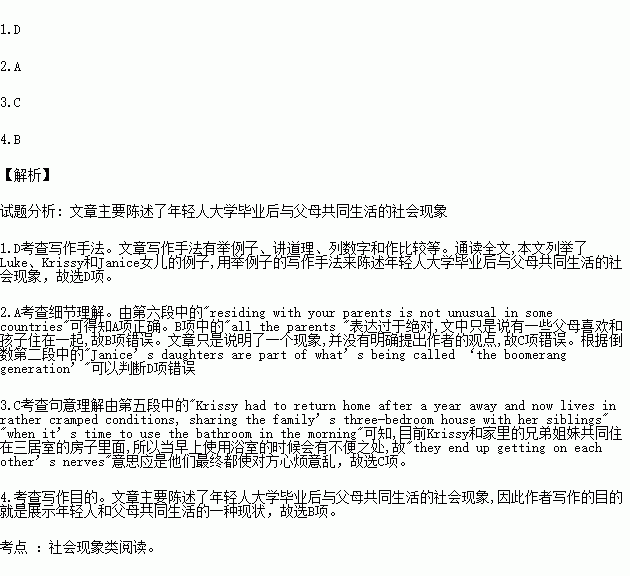题目内容
When Luke went to university he thought he would be on a new journey in life and getting his own place. In the UK, it’s common to fly the nest at a fairly young age. Many choose a flat-share; others make plans to get on the property ladder.
But the current economic situation forced Luke back to his mum’s house at the age of 27. And he’s not alone: a quarter of young adults in the UK now live with their parents. The Office for National Statistics said more than 3.3 million adults between the ages of 20 and 34 were living with their parents in 2013.
Lack of jobs and the high cost of renting accommodation made Luke change his plans. He’s upset. "There’s something very difficult about being an adult living in an environment where you’re still a child," he says. "It limits me socially; sometimes I feel it limits me professionally."
Indeed, many young people have no choice but to stay at "the hotel of Mum and Dad".
Krissy had to return home after a year away and now lives in rather terrible conditions, sharing the family’s three-bedroom house with her sisters. She says they end up getting on each other’s nerves when it’s time to use the bathroom in the morning.
Of course, living with your parents is not unusual in some countries. Economic conditions, culture, or family traditions mean many young people stay at home until they get married. Even then, it can be too expensive to rent or buy a house and the married couples continue to live at one of their parents’ homes.
But some parents seem to enjoy having their kids back at home. Janice’s daughters are part of what’s being called "the boomerang generation". She says, "I get to share their lives with them, and I’ve got to know them all as adults. We have the sort of conversations that good friends do."
So for some it’s a win-win situation — spending time with your families, and saving money.
1.How is the passage developed?
A. By listing figures
B. By making comparisons
C. By analyzing causes
D. By giving examples
2.We can learn from the passage that.
A. living with parents is common in some countries
B. all the parents enjoy living with their children
C. the author approves of children’s living with parents
D. Janice belongs to a group called "the boomerang generation"
3.What does the underlined sentence mean in the fifth paragraph?
A. They get on very well with each other.
B. They shout at each other angrily.
C. They finally make each other annoyed.
D. They are unwilling to share with each other.
4.What is the purpose of the passage?
A. To persuade children into living on their own after getting married.
B. To show the present situation of young people living with their parents.
C. To compare the advantages and disadvantages of living with parents.
D. To present the problems young adults may face after going to university.
 天天向上一本好卷系列答案
天天向上一本好卷系列答案 小学生10分钟应用题系列答案
小学生10分钟应用题系列答案
